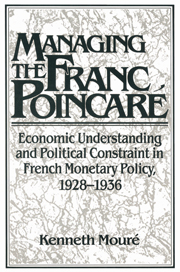 Managing the Franc Poincaré
Managing the Franc Poincaré Book contents
- Frontmatter
- Contents
- List of figures and tables
- Acknowledgments
- Abbreviations used in the notes
- Introduction
- 1 The depression in France
- 2 French gold accumulation, 1928–1932
- 3 The World Economic Conference and the gold bloc
- 4 The Bank of France: market control and interest-rate policy
- 5 The Treasury and government finance
- 6 The devaluation debate
- 7 Devaluation of the franc
- Conclusion
- Appendix
- Bibliography
- Index
3 - The World Economic Conference and the gold bloc
Published online by Cambridge University Press: 23 November 2009
- Frontmatter
- Contents
- List of figures and tables
- Acknowledgments
- Abbreviations used in the notes
- Introduction
- 1 The depression in France
- 2 French gold accumulation, 1928–1932
- 3 The World Economic Conference and the gold bloc
- 4 The Bank of France: market control and interest-rate policy
- 5 The Treasury and government finance
- 6 The devaluation debate
- 7 Devaluation of the franc
- Conclusion
- Appendix
- Bibliography
- Index
Summary
In 1931 the French bluntly rejected British suggestions of an international conference to coordinate efforts to combat the world depression. In 1933 France played a central role in both the organization and the failure of the World Economic Conference in London. French participation came about after dramatic changes in the world economy and international politics following the financial crises of 1931. The French opposition to an international economic conference in 1931 was based on fears of isolation and international pressures to redistribute gold reserves and concern that Germany would exploit such a forum to repudiate reparations. This genre of international cooperation held little attraction for the French.
By mid-1932 the French had less to fear from an international conference. The Gold Delegation's Final Report described uneven gold distribution as an “intermediate stage… which had its roots in war and inflationary disturbances of the economic system”, rather than a result of deliberate French policy and a cause of the crisis. Britain was less interested in a redistribution of gold reserves once the pound had gone off gold. The Lausanne conference in June 1932 effectively ended German reparations. The French remained suspicious of international economic cooperation, however. Pressure for a redistribution of gold reserves was still possible, and French understanding of the crisis allowed little opportunity for an international solution to the depression because remedies lay primarily in the realm of domestic policy. This combination of skepticism and suspicion marked French preparation for the World Economic Conference.
- Type
- Chapter
- Information
- Managing the Franc PoincaréEconomic Understanding and Political Constraint in French Monetary Policy, 1928–1936, pp. 80 - 119Publisher: Cambridge University PressPrint publication year: 1991
